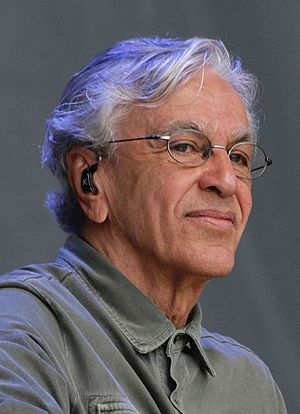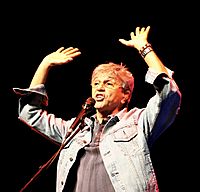Caetano Veloso facts for kids
Quick facts for kids
Caetano Veloso
|
|
|---|---|

Veloso in 2019
|
|
| Born |
Caetano Emanuel Viana Teles Veloso
7 August 1942 Santo Amaro, Bahia, Brazil
|
| Occupation |
|
| Years active | 1961–present |
| Spouse(s) |
Andrea Gadelha
(m. 1967; div. 1983)Paula Lavigne
(m. 1986; div. 2004) |
| Children | 4; including Moreno |
| Parent(s) |
|
| Relatives | Maria Bethânia (sister) |
| Musical career | |
| Genres |
|
| Instruments | Vocals, guitar |
| Labels | |
| Associated acts |
|
| Signature | |
 |
|
Caetano Emanuel Viana Teles Veloso (born 7 August 1942) is a famous Brazilian composer, singer, guitarist, and writer. He first became known in the 1960s for his part in a Brazilian music movement called Tropicália. This movement mixed music, theater, and poetry.
Caetano Veloso has been a very creative and popular artist for many years. He has won many awards, including nineteen Brazilian Music Awards, nine Latin Grammy Awards, and two Grammy Awards. In 2012, he was honored as the Latin Recording Academy Person of the Year.
Veloso was one of seven children. He was born in Santo Amaro da Purificação, in Bahia, Brazil. He moved to Salvador, the state capital, for college in the mid-1960s. Soon after, he won a music contest and got his first record deal. He helped start the Tropicália movement with other musicians and artists, including his sister Maria Bethânia.
However, the Brazilian military government at the time saw Veloso's music and ideas as a challenge. He was arrested in 1969 with fellow musician Gilberto Gil. They were later sent away from Brazil and lived in London for two years. In 1972, Veloso returned to Brazil and continued making music. He became popular outside Brazil in the 1980s and 1990s.
Contents
Early Life and Music
Caetano Veloso was born in Santo Amaro da Purificação, Brazil. He was the fifth of seven children. As a child, he loved art, especially literature and filmmaking. But he focused mostly on music.
The music style called bossa nova greatly influenced him. João Gilberto, a famous bossa nova musician, was a big inspiration. Veloso was 17 when he first heard Gilberto. He calls Gilberto his "supreme master" for bringing new ideas to Brazilian music. As a teenager, Veloso moved to Salvador, a city known for Afro-Brazilian culture and music.
In 1965, Veloso moved to Rio de Janeiro with his sister Maria Bethânia, who was also a musician. He won a contest for his song "Um Dia" and signed with Philips Records.
The Tropicália Movement
On 21 October 1967, Veloso won fourth prize at a music festival with his song "Alegria, Alegria." This performance, along with his friend Gilberto Gil's, was important. It was one of the first times rock bands played at the festival.
During this time, Veloso, Bethânia, Gilberto Gil, Gal Costa, Tom Zé, and Os Mutantes created "Tropicalismo." This new style mixed Brazilian pop music with rock and roll and experimental music. Veloso said the movement wanted to be different from the government's strict rules.
The main album of the Tropicalist movement was Tropicália: ou Panis et Circencis. It came out in 1968. This album brought together Veloso, Os Mutantes, Gilberto Gil, Tom Zé, and Gal Costa. It had special music arrangements and lyrics from poet Torquato Neto. The album cover was inspired by The Beatles' Sgt. Pepper's Lonely Hearts Club Band.
The ideas of the Tropicalistas caused some debate among young people in Brazil. Some students thought it was too commercial because it used music from other cultures, like the United States.
Veloso studied philosophy at the Universidade Federal da Bahia. His studies helped shape his art and his views on life. His political ideas were against the strict Brazilian military government, which ruled until 1985. Because of this, many of his songs were censored or banned.
Arrest and Exile
In October 1968, Caetano Veloso and Gilberto Gil performed in Rio de Janeiro. A journalist spread a false story that they had sung the Brazilian National Anthem in a disrespectful way. On 27 December 1968, both musicians were arrested without a trial. This happened shortly after the government passed a law that suspended basic rights.
Veloso and Gil were held in prison for three months. Then they were under house arrest for four more months. They were eventually released but had to leave the country. They spent the next few years living in London, England. Veloso said that London felt "dark" and he felt "far away from myself." However, they used this time to improve their music.
Musical Career
Return to Brazil and Global Success
When Veloso returned to Brazil in 1972, his music often blended different international styles with Brazilian folk music and rhythms. His popularity grew outside Brazil in the 1980s, especially in Greece, Portugal, France, and Africa. His albums released in the United States, like Estrangeiro, helped him reach a wider audience.
In 1993, Veloso and Gilberto Gil released a CD called Tropicalia 2 to celebrate 25 years of Tropicalismo. One song, "Haiti," talked about important social issues in Haiti and Brazil, such as poverty and homelessness.
By 2004, Veloso was a highly respected international pop star. He had more than 50 recordings. His songs were featured in movie soundtracks like Eros, Hable con ella, and Frida. He even performed at the 75th Academy Awards for the movie Frida. In 2002, Veloso wrote a book about his early life and the Tropicalismo movement called Tropical Truth: A Story of Music and Revolution in Brazil.
His first album sung entirely in English was A Foreign Sound (2004). It included a cover of Nirvana's "Come as You Are" and classic American songs.
Veloso has also contributed songs to albums that raise money for AIDS research. These include Red Hot + Rio (1996) and Onda Sonora: Red Hot + Lisbon (1998). In 2011, he contributed to Red Hot + Rio 2, including a song with David Byrne.
His September 2006 album, Cê, won two Latin Grammy Awards. One was for best singer-songwriter, and the other was for Best Portuguese Song, "Não Me Arrependo."
With a total of nine Latin Grammy Awards and two Grammy Awards, Veloso has won more than any other Brazilian performer. He is considered one of the greatest songwriters of the century. People compare his importance in international pop music to artists like Bob Dylan, Bob Marley, and Lennon/McCartney.
In August 2016, Caetano Veloso performed "Isto aqui, o que é?" at the 2016 Summer Olympics opening ceremony. He sang alongside Anitta and Gilberto Gil. In May 2018, Veloso performed at the 2018 Eurovision Song Contest in Lisbon with the 2017 winner Salvador Sobral. His live album Ofertório (Ao Vivo) (recorded with his sons Moreno, Zeca, and Tom) was named one of the best Brazilian albums of 2018.
In 2023, Rolling Stone magazine ranked Veloso among the 200 Greatest Singers of All Time.
Personal Life
Veloso married Andrea Gadelha on 21 November 1967. Their son Moreno was born in 1972. They also had a daughter, Júlia, who sadly passed away shortly after birth in 1979. Veloso and Andrea separated in 1983.
He later married Paula Lavigne in 1986. They had two sons, Zeca Lavigne Veloso (born 1992) and Tom Lavigne Veloso (born 1997). They separated in 2004 but continued to work together. In 2016, they reunited.
Veloso was raised in a religious Catholic family but chose not to follow the faith later in life. He has stated that he does not believe in God. Despite this, two of his sons became members of a church, and Veloso attended their baptism, saying that "what is good for them is good for me."
Musical Style

Veloso's home state, Bahia, has greatly influenced his music. He values Bahia for its history in Brazil and its contributions to Brazilian music. He has mentioned Amália Rodrigues, Cole Porter, the Rolling Stones, and especially João Gilberto as musical influences.
Veloso believes his music has improved over time. He feels he is "better at everything" now compared to his earlier work during the Tropicália period.
Discography
Studio albums
|
Live albums
Soundtracks
Compilations
|
Awards and Honors
See also
 In Spanish: Caetano Veloso para niños
In Spanish: Caetano Veloso para niños

